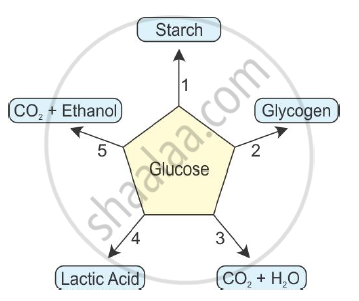Advertisements
Advertisements
Question
Explain why, it is dangerous to inhale air containing carbon monoxide.
Solution
Carbon monoxide combines with haemoglobin and forms carboxyhaemoglobin by replacing the oxygen. This reduces the oxygen carrying capacity of the blood. Due to the lack of oxygen, the person cannot breathe properly. In extreme cases, a person may even die due to oxygen starvation. Hence, it is dangerous to inhale the air containing carbon monoxide.
APPEARS IN
RELATED QUESTIONS
Given below are the end products of different reactions involving glucose.

Write the reaction number in front of the following:
(i) Anaerobic reaction =
(ii) Reaction in the human muscles =
(iii) Aerobic respiration =
(iv) Reaction in the plant cells =
(v) Reaction in the liver
Given below is a square of letters in which are hidden different words related to respiration in organisms. These words may be present in any direction − upwards, downwards, or along the diagonals. Find the words for your respiratory system. Clues about those words are given below the square.

- The air tubes of insects
- Skeletal structures surrounding chest cavity
- Muscular floor of chest cavity
- Tiny pores on the surface of leaf
- Small openings on the sides of the body of an insect
- The respiratory organs of human beings
- The openings through which we inhale
- An anaerobic organism
- An organism with tracheal system
What would happen if all the green plants disappear from the earth?
Name an animal which depends on simple diffusion of gases for breathing.
Fill in the following blank with suitable word:
Gills are the breathing organs in ___________.
Describe the process of respiration in the following part of a plant:
Leaves
Explain how, the air we breathe in gets cleaned while passing through the nasal passage.
The two organisms which breath only through their moist skin are:
During the respiration of an organism A, 1 molecule of glucose produces 2 ATP molecules whereas in the respiration of another organism B, 1 molecule of glucose produces 38 ATP molecules.
(a) Which organism is undergoing aerobic respiration?
(b) Which organism is undergoing anaerobic respiration?
(c) Which type of organism, A or B, can convert glucose into alcohol?
(d) Name one organism which behaves like A.
(e) Name two organisms which behave like B.
An animal in which the oxygenation of blood does not take place in the lungs is:
Answer this question.
Name the organ of respiration in fishes.
Name the body structure concerned with the given functional activity:
Protects the lungs from mechanical injury
Name the body structure concerned with the given functional activity:
Provides actual diffusion of respiratory gases in the lungs.
Given below is an example of certain structure and its special functional activity:
"Kidney and excretion".
Fill in the blanks on a similar pattern.
Diaphragm and _____________.
State one function of the following:
Ciliated epithelium lining the respiratory tract
State one function of the following:
Pleural fluid
The major fraction of CO2 released during cellular respiration is transported by the blood to the lung capillaries ______
Mark the following statement as True or False. Correct the false statement.
Insects have spiracles on the lower surface of the body.
Match the correct answers with the type of respiration and respiratory substances.
| Respiration | Types of Substrates |
| A. Floating respiration | I. Proteins |
| B. Cytoplasmic respiration | II. Glucose |
| C. Protoplasmic respiration | III. Carbohydrates and fats |
